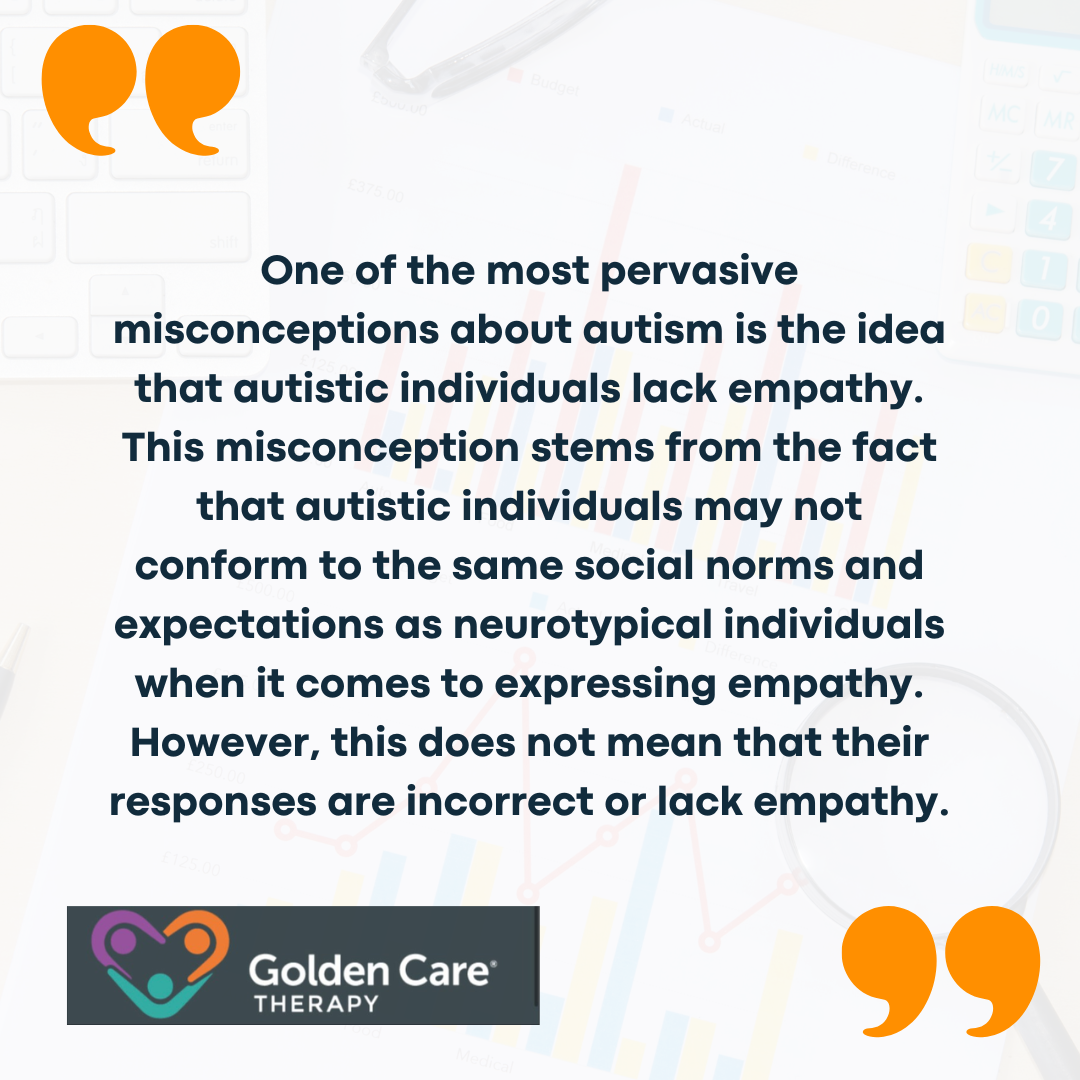Empathy, which is the ability to understand and share the feelings of others, is a complex phenomenon that can manifest differently in autistic individuals. As such, it is important to dispel misconceptions surrounding empathy in autism and understand the unique challenges that individuals with autism face in identifying and expressing emotions.
This article will go through that topic to find out whether autistic individuals have empathy or not.

Empathy in Autistic Individuals
Autistic individuals may experience empathy differently than neurotypical individuals. While they may have difficulty identifying the emotional behavior of others, such as distinguishing between expressions of happiness or sadness, this does not mean they lack empathy. Their responses may simply differ from what is expected based on societal norms.
It is important to recognize that their own unique neurodivergent experiences may influence autistic individuals’ perception of emotions and expression. Their responses to emotional situations might not align with neurotypical expectations, but this does not imply a lack of empathy.
Autistic individuals can still feel and understand emotions, albeit in their own distinct ways.
Challenges in Identifying Emotions
One challenge that autistic individuals often encounter is the difficulty in identifying and interpreting nonverbal social cues, such as facial expressions and gestures. They may struggle to recognize and name emotions based on these cues, which can impact their ability to understand the emotional state of others accurately.
Eye scan studies have revealed that autistic individuals tend to focus on the periphery of a face rather than the eyes and mouth, where emotions are typically displayed.
This difference in visual attention may contribute to the challenges in recognizing facial expressions and understanding the emotions they convey.
It is crucial to approach empathy in autism from a comprehensive perspective. While autistic individuals may face difficulties in cognitive empathy, their emotional empathy can be intact or even heightened. Some newer research suggests that autistic individuals may experience emotions more intensely, indicating strong affective empathy.

Factors Influencing Empathy
When considering empathy in the context of autism, it’s important to understand the various factors that can influence how empathy is experienced by individuals on the autism spectrum.
There are two key factors to consider in this case which are as follows:
Cognitive Empathy vs. Affective Empathy
Empathy can be broken down into two distinct components: cognitive empathy and affective empathy.
Cognitive empathy refers to the ability to recognize and understand another person’s mental states, such as their thoughts, feelings, and intentions. Affective empathy, on the other hand, involves responding to another person’s mental state with an appropriate emotional response.
Autistic individuals often display deficits in cognitive empathy, meaning they may struggle with recognizing and interpreting emotions based on facial expressions and social cues. However, it’s important to note that autistic individuals can still experience affective empathy, demonstrating an intact emotional response to the emotions of others. This suggests that while cognitive empathy may be impaired, affective empathy remains intact in many cases.
Alexithymia
Another important factor to consider is the presence of alexithymia, which is characterized by difficulties in identifying and describing one’s own emotions.
Research has shown that individuals with autism but without alexithymia tend to exhibit typical levels of empathy, indicating that autism itself is not associated with a lack of empathy.
However, individuals with alexithymia, regardless of whether they have autism, tend to demonstrate reduced levels of empathy. This suggests that alexithymia plays a significant role in empathy deficits. Alexithymia can co-occur with autism, and in such cases, it can further impact the experience and expression of empathy.
Misconceptions and Realities
Contrary to popular belief, autistic individuals do have the capacity for empathy, but their expression and recognition of emotions may differ from neurotypical individuals.

Autistic individuals may have a unique way of experiencing and expressing empathy that is different from what is typically observed in neurotypical individuals. It’s important to recognize and appreciate these differences without making assumptions about their level of empathy.
Hyper Empathy in Autism
In some cases, autistic individuals may experience what is known as hyper empathy. Hyper empathy refers to an increased ability to share and experience the emotions of others as their own. This heightened sensitivity can lead to difficulties in distinguishing one’s own emotions from others’ emotions.
While hyper empathy may seem like a positive trait, it can also pose challenges for autistic individuals. The overwhelming emotions they experience from others can be intense and difficult to manage. This can sometimes lead to emotional exhaustion and difficulties in regulating their own emotions.
It’s crucial to understand that the experiences of empathy in autism can vary greatly from person to person. While some autistic individuals may struggle with recognizing and expressing emotions, others may exhibit hyper empathy.
The key lies in acknowledging and supporting these differences, rather than assuming a lack of empathy based on preconceived notions.

Research Insights
Research provides valuable insights into the variability of empathy in autistic individuals. There are two key aspects to consider which are as follows:
Empathy Variability
Autistic individuals are characterized by deficits in cognitive empathy, which refers to the ability to recognize and understand another person’s mental states. However, their emotional empathy, which involves responding to another person’s mental state with an appropriate emotion, remains intact.
A large body of research has shown that while autistic individuals may have reduced cognitive empathy, their emotional empathy is generally preserved. It is important to note that findings regarding empathy in autism can be mixed, highlighting the need for a more nuanced understanding.
Interestingly, studies have revealed that some individuals with higher emotional empathy than cognitive empathy (referred to as empathic disequilibrium) may exhibit elevated autistic traits.
This empathic disequilibrium towards emotional empathy allows for a deeper exploration of the links between empathy and autism, providing a novel analytical approach to understanding the role of empathy in autism.
Impact of Alexithymia
Approximately half of autistic individuals also experience alexithymia, which is a personality trait characterized by difficulty expressing or identifying emotions. This trait can have implications for empathy and understanding emotions.
People with alexithymia may still care about others’ feelings, but their difficulty in recognizing and understanding certain emotions, such as anger, can make it challenging to respond empathically in specific situations. Interestingly, individuals with alexithymia have shown increased distress when witnessing others’ pain, indicating a complex relationship between empathy and alexithymia.
While autism is not directly associated with problems in emotion recognition, difficulties in recognizing and understanding emotions due to alexithymia can contribute to challenges in labeling emotions, especially in overwhelming situations.

Strategies for Enhancing Empathy
Fortunately, various strategies can be employed to enhance empathy in individuals with autism. These strategies involve the following:
Teaching Cognitive Empathy
Autistic individuals may struggle with cognitive empathy, which involves recognizing and naming emotions based on facial expressions. Eye scan studies have revealed that autistic individuals tend to focus on the periphery of a face rather than the eyes and mouth, where emotions are typically displayed.
Various techniques can be used to enhance cognitive empathy in autistic children. One effective approach is role-playing situations that elicit empathetic responses. By engaging in these scenarios, children can practice and develop their ability to understand and respond to others’ emotions.
Modeling, prompting, and reinforcement can also be beneficial in teaching cognitive empathy. Autistic individuals can be guided to respond to another person’s emotions with appropriate phrases, tone of voice, facial expressions, and gestures.
By providing clear examples and positive reinforcement, children can learn to navigate social interactions and demonstrate empathy in their interactions with others.
It’s important to note that while autistic individuals may struggle with cognitive empathy, there is a large body of research suggesting that they have intact emotional (affective) empathy alongside reduced cognitive empathy. It’s crucial to have a nuanced understanding of empathy in the context of autism.

Providing Support for Emotional Understanding
Autistic individuals may sometimes be incorrectly judged as lacking empathy due to their different social norms and responses. However, this does not mean their responses are incorrect or lack empathy.
Supporting emotional understanding in individuals with autism involves recognizing and valuing their unique ways of responding to others’ mental states. Autistic individuals may have deficits in cognitive empathy, which involves recognizing another person’s mental state.
However, they often have intact emotional empathy, which involves responding to another person’s mental state with an appropriate emotion.
It’s important to create an environment that acknowledges and supports these emotional responses. By understanding and accepting the differences in cognitive empathy, individuals with autism can feel valued and appreciated for their emotional empathy. This can contribute to their overall well-being and their ability to form meaningful connections with others.
Research has shown that autistic traits can vary, with some individuals exhibiting relatively higher emotional empathy than cognitive empathy. This empathic disequilibrium towards emotional empathy has been linked to social traits relevant to autism.
By incorporating strategies that focus on teaching cognitive empathy and providing support for emotional understanding, we can enhance empathy in individuals with autism. These approaches can contribute to their social and emotional development, ultimately fostering more meaningful and empathetic connections with others.
If you’re seeking specialized ABA therapy in New Jersey, Indiana, Georgia, and New York, Golden Care offers comprehensive services tailored to meet the unique needs of each individual. Contact us to learn more or book a consultation today.
Sources:
https://www.ncbi.nlm.nih.gov/pmc/articles/PMC9804307
https://www.verywellhealth.com/do-people-with-autism-lack-empathy-259887
https://www.medicalnewstoday.com/articles/do-autistic-people-have-empathy
https://www.scientificamerican.com/article/people-with-autism-can-read-emotions-feel-empathy1
https://www.autism360.com/empathy-and-autism-myths-facts-and-more



